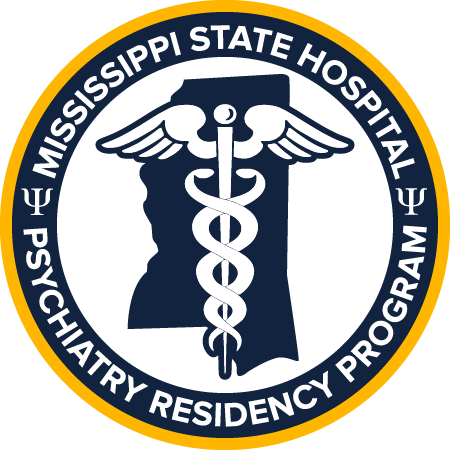The Mississippi State Hospital Psychiatry Residency Program is committed to the well-being of its residents and faculty. We recognize that psychological, emotional, and physical well-being play crucial roles in the development of competent, caring, and resilient physicians.
The hospital, program leadership, faculty, and staff recognize that placing a priority on mental health enables healthcare professionals to better care for themselves and their patients. The Office of Graduate Medical Education provides access to various services designed specifically for residents to receive support in dealing with the unique challenges during training. These services and resources are designed to support and promote well-being in the clinical learning environment.
Preventing Burnout
Burnout is a long-term stress reaction marked by emotional exhaustion, depersonalization, and a lack of sense of personal accomplishment at work and home. Among various professions in the U.S., physicians experience the highest and most significant levels of burnout.
Resident physicians who are suffering from burnout may experience symptoms including:
- Feelings of depression
- Impaired concentration and attention
- Reduced job satisfaction
- Feeling detached from coworkers, patients, family, and friends
- Experiencing dread before going to work
- Reduced job satisfaction
- Feelings of anxiety
- Decreased productivity
- Use of alcohol or other drugs, including prescription drugs, to cope
- Insomnia
- Being irritable with patients
- Suicidal ideation
- Decreased self-esteem
- Absenteeism
- Exhaustion
The stress of residency takes its toll on even the best residents and has become an issue of national concern. The Mississippi State Hospital offers services through an Employee Assistance Program to prevent staff burnout and help trainees thrive in a supportive work environment. During orientation, and throughout each year, residents will be encouraged to utilize employee resources if they experience symptoms of burnout and/or feel intervention is needed. Residents are also encouraged to identify their own primary care physician as an important step away from treating oneself and a step toward wellness.
Residents may meet confidentially with appropriately credentialed mental health professionals to proactively address concerns about fatigue management, burnout, depression, or other manifestations of stress. Residents will also be educated about the benefits available with the employee insurance plan.
Resident Intervention
Residents who feel they are experiencing anxiety, physical illness, stress, depression, or burnout are encouraged to contact their Program Director, Associate Program Director, DIO, faculty mentor, or Employee Assistance Program. All participant information is kept completely confidential.
Annual Wellness Survey
The program will administer the Mini Z Burnout Survey offered by the American Medical Association at the beginning of each year so that residents can self-assess their current state of wellness and burnout. Residents can complete the survey individually. The tool is 100% anonymous and individual information and scores are private.
This survey is not a substitute for professional care. Residents who recognize signs of burnout are encouraged to contact Mississippi State Hospital’s Employee Assistance Program and/or their Program director, Associate Program Director, DIO or faculty mentor.
Wellness Committee
The Residency Wellness Committee, comprised of resident representatives, members of residency leadership, and other invited guests (Pastoral Care, Employee Assistance Program, Employee Health, etc.) meets quarterly.
Resident Meetings
Each class meets regularly as a group with the Chief Resident, Program Director, and Program Administrator. These frequent meetings foster open communication, allow issues to be addressed in a timely manner, provide an opportunity for residents to set their own agenda, and encourage resident involvement.
Resident Council, comprised of residents, meet regularly with resident elected officers and class representatives, to discuss resident-specific issues. These frequent meetings provide privacy for residents to speak openly about concerns individuals or the the group is having.
Financial Counseling
Annually, the program brings in a financial counselor for informal discussions with interested residents. Topics include budgeting, debt management, and financial planning.
Resident Retreat
The Psychiatry Residency Program hosts a full-day semi-annual retreat. Residents are excused from all clinical duties during this time. The retreat provides an opportunity for residents to meet in one location, get to know one another, and socialize in a non-clinical setting. Residents are encouraged to discuss their experiences over the year and offer suggestions for changes. There are indoor and outdoor challenge courses to foster team-building skills and camaraderie.
Mentoring
The program pairs each intern with an upper-level resident or faculty member as part of our mentoring program. The mentor function is to ease the transition to residency by providing social and academic support through quarterly meetings.
Resident Wellness Workshop
Each year, the program plans a dedicated day to wellness, based on the interests of the current residents. The Wellness Workshop covers topics ranging from nutrition to meditation/mindfulness and group exercise.
Group Wellness Events
The program schedules group wellness events to encourage residents and faculty to relax and connect with one another outside of the workplace. Events include: potlucks hosted by the faculty, movie dinners, and holiday celebrations.
Employee Assistance Program
Mississippi State Hospital and the Psychiatry Residency Program leadership faculty and staff understand that residency can be a major source of stress and fatigue and offer confidential counseling through the Employee Assistance Program to residents who may be experiencing depression and/or suicidal ideation.
